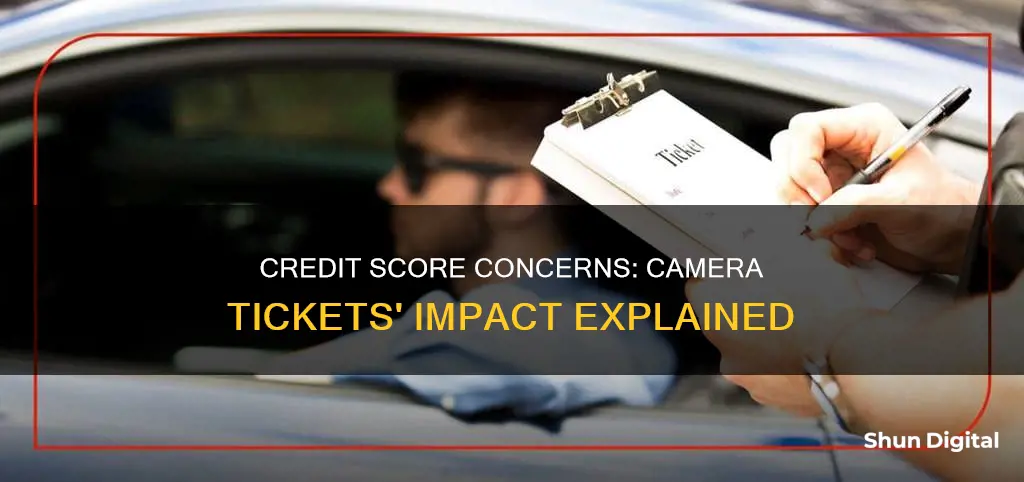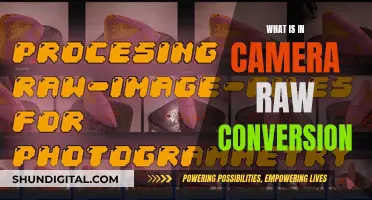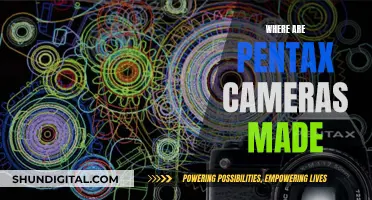
Getting a ticket from a camera in the mail can be frustrating, especially if you weren't the one driving. It's natural to wonder about the consequences of not paying it, including whether it will affect your credit score. While it's essential to understand the potential repercussions, it's a myth that camera tickets alone will directly impact your credit score. Here's what you need to know about how these tickets work and how they might indirectly affect your financial standing.
In most cases, camera tickets, such as those issued for running a red light or speeding, are handled by the local municipality and don't appear on your credit report from the three major credit bureaus (Experian, TransUnion, and Equifax). These tickets typically don't require involvement from a debt collection agency, and they won't show up on your credit report unless they go unpaid for an extended period and are sent to collections. Even then, the impact on your credit score may be minimal if the ticket amount is relatively small.
However, it's important to understand that unpaid camera tickets can lead to other consequences, such as fines, late fees, and penalties. In some jurisdictions, they may also affect your ability to renew your driver's license or vehicle registration. Additionally, if you have multiple unpaid tickets, there could be more severe repercussions, such as your vehicle being booted or impounded.
To avoid any potential impact on your credit score and other negative consequences, it's generally advisable to pay camera tickets promptly. If you disagree with a ticket, you may have the option to dispute it through the issuing agency or seek legal advice. Remember, while a single camera ticket may not significantly affect your credit score, multiple unpaid tickets or other financial delinquencies could collectively harm your creditworthiness over time.
| Characteristics | Values |
|---|---|
| Do camera tickets affect your credit score? | No, camera tickets do not directly affect your credit score. However, if the ticket is sent to a collection agency and remains unpaid, it can indirectly impact your credit score. |
| Collection agency involvement | If a camera ticket is sent to a collection agency, it is important to resolve the debt to avoid potential negative consequences on your credit score. |
| Credit score impact | The impact of an unpaid collection account on your credit score varies depending on the credit scoring model used. Newer models, such as FICO® 9 and VantageScore 3.0, tend to ignore collection accounts with zero balances. |
| Payment history | Payment history makes up 35% of your credit score. Delinquent payments, including those for camera tickets sent to collections, can remain on your credit report for up to seven years. |
| Credit report inclusion | Camera tickets, including red-light camera citations, are generally not included in credit reports from major credit bureaus (Equifax, Experian, and TransUnion). |
What You'll Learn
- Camera tickets are handled differently from parking and police-issued tickets
- Camera tickets can be pursued by debt collectors but won't be included in credit reports
- Tickets sent to collections can affect your credit score
- Disputing the ticket can help remove the debt from the debt collection agency's books
- Ignoring tickets can lead to fines, car impoundment, and license suspension

Camera tickets are handled differently from parking and police-issued tickets
The consequences of not paying camera tickets vary depending on the jurisdiction. In some states, these tickets may be sent to debt collection agencies, which can affect your credit score if reported to the credit bureaus. However, it is important to note that in many states, these tickets are not reported to the credit bureaus and do not directly impact your credit score. Nonetheless, ignoring camera tickets can lead to additional fines, penalties, and even legal consequences.
It is always advisable to review the specific laws and regulations in your state regarding camera tickets and their potential impact on your credit score. Understanding your rights and responsibilities will help you make informed decisions when dealing with these types of tickets.
While camera tickets may not always affect your credit score, it is essential to stay vigilant and prioritize payment to avoid any unforeseen repercussions. Additionally, staying informed about the rules and regulations in your area can help you avoid receiving these tickets in the first place.
Charging Your VGR B Car DVR Camera Radar Detector
You may want to see also

Camera tickets can be pursued by debt collectors but won't be included in credit reports
Firstly, it's crucial to distinguish between camera tickets and traditional parking or traffic tickets. Camera tickets, such as those issued by red-light cameras or automated devices, are handled differently. In some jurisdictions, these tickets may be sent directly to a collection agency, which can result in a lengthy and costly process to resolve the issue.
According to credit experts, unpaid camera tickets do not directly affect your credit score or appear on your credit report. This is because the three major credit reporting agencies (Equifax, Experian, and TransUnion) no longer include public record information like municipal records or traffic tickets on credit reports. However, it's important to note that this does not mean you can simply ignore camera tickets.
The consequences of unpaid camera tickets can vary. In some cases, they may result in the suspension of your driver's license, difficulties with vehicle registration, or even the impoundment of your vehicle. Additionally, while the tickets themselves may not affect your credit score, if they are sent to a collection agency, they can indirectly impact your creditworthiness. This is because collection accounts are considered part of your payment history, which carries significant weight in determining your credit score.
To avoid potential issues, it's advisable to pay camera tickets promptly and maintain proper records. While it may be frustrating to receive these tickets, addressing them in a timely manner can help prevent further complications. Remember, while camera tickets themselves may not appear on your credit report, debt collection accounts related to unpaid tickets can negatively impact your overall creditworthiness and financial standing.
In summary, while camera tickets won't be included in your credit report, failing to address them can lead to financial headaches and legal consequences. It's always best to stay on top of these matters and resolve them promptly to avoid any unnecessary hassles.
Charging Your Fujifilm Camera Battery: How Long Does It Take?
You may want to see also

Tickets sent to collections can affect your credit score
While camera tickets themselves do not directly affect your credit score, if they are sent to a collection agency and remain unpaid, they can negatively impact your credit score. This is because collection accounts are considered part of your payment history, which carries the most weight in determining your credit score.
Collection accounts can remain on your credit report for up to seven years from the original delinquency date, or the date your account became 30 days past due. The good news is that as collection accounts age, their impact on your credit score diminishes over time until they are removed from your credit report entirely.
It's important to note that not all jurisdictions or states allow collection agencies to report unpaid tickets to credit bureaus. Additionally, there are disputes about whether collection agencies have the necessary information, such as a Social Security number, to report to credit bureaus.
To avoid any potential impact on your credit score, it is advisable to pay any camera tickets you receive promptly and to check your credit report regularly for any unexpected entries.
Latest Camera Raw Update for CS5
You may want to see also

Disputing the ticket can help remove the debt from the debt collection agency's books
Disputing a camera ticket can be done in several ways, and it's important to act promptly as failure to appear before the provincial or traffic court may result in a mark of guilt and immediate payment of the fine. In British Columbia, for example, residents have 45 days to dispute a ticket received by mail and 30 days for a ticket served by a third-party company. In New York, residents have 30 days to dispute a ticket and avoid a $25 late penalty fee.
There are several ways to dispute a ticket: by mail, in-person, or online. When disputing a ticket, it's important to research common defences and gather any necessary documents to support the dispute. For example, if you were making a legal right turn on red when the camera took the photo, you should be able to get the ticket dismissed. Other defences include arguing that the photograph used as evidence is hearsay or that the camera equipment was not properly maintained.
If you are unable to dispute the ticket, you may be able to request a fine reduction or more time to pay. In British Columbia, for instance, residents can complete a Violation Ticket Notice of Dispute form and a Violation Ticket Statement and Written Reason form to request a fine reduction or more time to pay.
While an unpaid camera ticket may not directly affect your credit score, if it is sent to a collection agency, it can appear on your credit report for seven years from the original delinquency date. Therefore, it is important to resolve unpaid camera tickets before they are sent to collections. If a collection account related to a camera ticket appears on your credit report, you can take steps to offset its negative impact, such as making all future payments on time and maintaining a low credit utilization rate.
Mastering Adjustment Brush Undo in Camera Raw
You may want to see also

Ignoring tickets can lead to fines, car impoundment, and license suspension
While camera tickets don't affect your credit score, ignoring them can lead to some serious consequences. If you ignore a traffic ticket, the court will mark it as a failure to appear or respond, also known as an FTA. The infraction is ruled as committed and goes on your driving record. You will have to pay the fine stated on the ticket, plus an additional default penalty. If you don't pay these penalties, the court will send them to a collection agency and notify the Department of Licensing (DOL). An FTA on your record will result in a suspension of your license for any moving violation until you resolve the FTA by setting up a payment plan.
If you don't respond to a traffic ticket, you will likely receive a warrant for "Failure To Appear -- Traffic" or FTA. This can result in the loss of your license or even your vehicle. As time passes, your fines will increase, and you may lose your license. The more you procrastinate, the harsher the penalties you will face.
Ignoring a traffic ticket can also lead to jail time, even if it's just for a few days. If you're a repeat offender, the consequences can be more severe. It's important to take traffic tickets seriously and deal with them promptly to avoid these consequences.
Staples: Your One-Stop Shop for Camera Battery Needs
You may want to see also
Frequently asked questions
No, camera tickets do not affect your credit score. However, if they are sent to a collection agency, they may affect your credit score.
If you do not pay your camera ticket, it may be sent to a collection agency, which could affect your credit score. Additionally, depending on state and local laws, your driver's license could be suspended, you might not be able to register your car, your vehicle could be booted or impounded, or a warrant might be issued for your arrest.
It is important to pay your camera ticket on time to avoid any potential negative consequences. If you believe you have received the ticket in error, you can dispute it with the issuing agency or seek legal advice.
You will receive a letter from the collection agency if your camera ticket has been sent to them. It is important to respond to this letter and clarify the validity of the debt.
No, it is not advisable to ignore camera tickets. While they may not directly affect your credit score, they can lead to legal and financial consequences if left unpaid.







